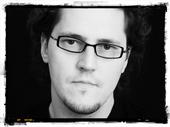Stefan Anion was introduced to dance music at a very young age. His father was the DJ at a local discotheque, and his mother often listened to early electronic music by Kraftwerk, Brian Eno, Jean Michel Jarre, and others. From infancy through his teenage years, the sounds of motown, soul, 80’s electro, synth-pop, and even classical radiated through the house.
Stefan lived off of MTV in the early 80’s (when music was still the only programming) and was exposed to a variety of new, exciting sounds like ska, punk, and synth-pop. In 1989, a brief trip to England introduced him to the sounds of acid house. Even at the age of thirteen, Stefan managed to spend night after night in local English clubs and underground parties where he became hooked on the new electronic dance sound.
After moving to the US in 1991, Stefan discovered the sound of early “rave†music through a local Dallas dance radio show. He decided to become a DJ himself and began purchasing 12? dance records at the age of sixteen. Stefan acquired a cheap set of turntables and a small mixer, and started practicing the art of mixing until his first performance at a local outdoor event in 1996. Being a DJ wasn’t enough, and after playing local underground events for about a year, Stefan decided to enter the realm of production armed with nothing more than an outdated Macintosh computer and a demo of Propellerheads “Rebirthâ€. “I remember writing my tracks in fifteen minutes, and then jotting down all the settings in a little book I kept before the demo quit working. Then I’d re-open it, program the synths and drums, and record the whole thing to tape. I still have loads of those tapes today, including my book full of song settings.â€
Throughout university, Stefan acquired more studio equipment and a brand new computer so he could focus more and more on refining his sound. In 1998, Stefan published his first EP under the “Cycle One†moniker on the then-popular mp3.com. The EP rose to 4 in the Detroit dance charts. Later that year, he met fellow producer Bernhard Pucher (a.k.a. Brian Aneurysm) at a local club and the two decided to start an artist collective called the “AI Collective†that became known around the world. During the AI Collective days, Stefan got a taste for live performance and soon became the producer and keyboardist for a local synth-pop band called “The Mind Theory.â€
After the band split in 2003, Stefan decided to focus on his solo career, and began working on a variety of remixes and original productions. In 2004, one week before a club gig, Stefan decided to remix Gary Jules “Mad World†from the Donnie Darko Soundtrack. “It took me 3 days to do the remix and I never intended it to come out at all - it was just to have something cool to play at gigs. When I played the track during my set, the whole club started singing and cigarette lighters went up in the air - it was surrealâ€. A friend decided to fund the release of “Mad World Remix,†which sold out within the first two months. Canadian record label Release Records got hold of the single and decided to sign Stefan to their label in mid-2004. Being signed to his first label paved the way for countless more remixes and singles. Stefan Anion has remixed the likes of Noel Sanger, Tony Estrada, Sunscreem, Hybrid and more. Stefan’s remixes and originals have appeared on compilations, top radio charts and countless playlists. As a DJ, Stefan has played all over the US where his DJ performances have gained much respect and are known for their attitude, energy, and “wild†music selection.
Stefan Anion also hosts the popular monthly Blue Industries Radio Show on Proton Radio .
